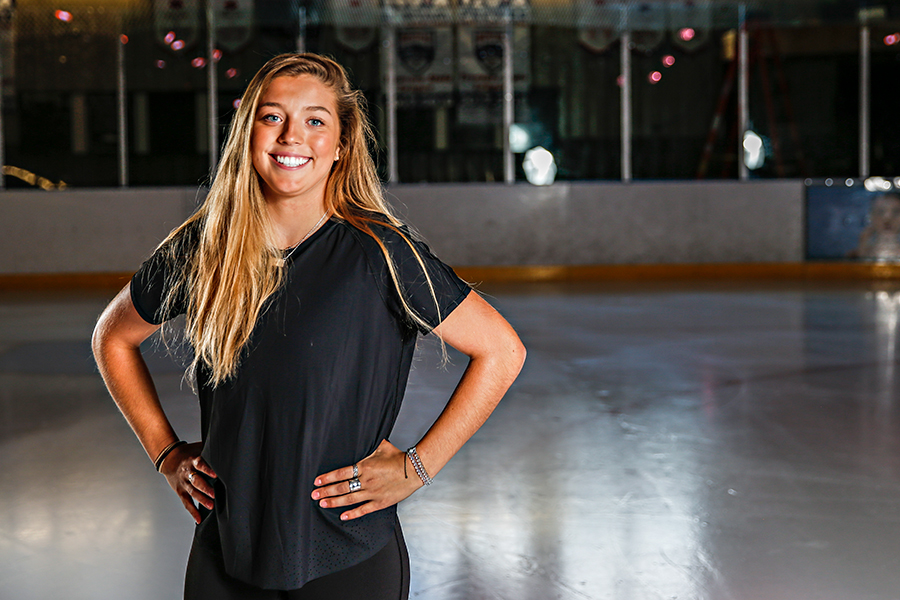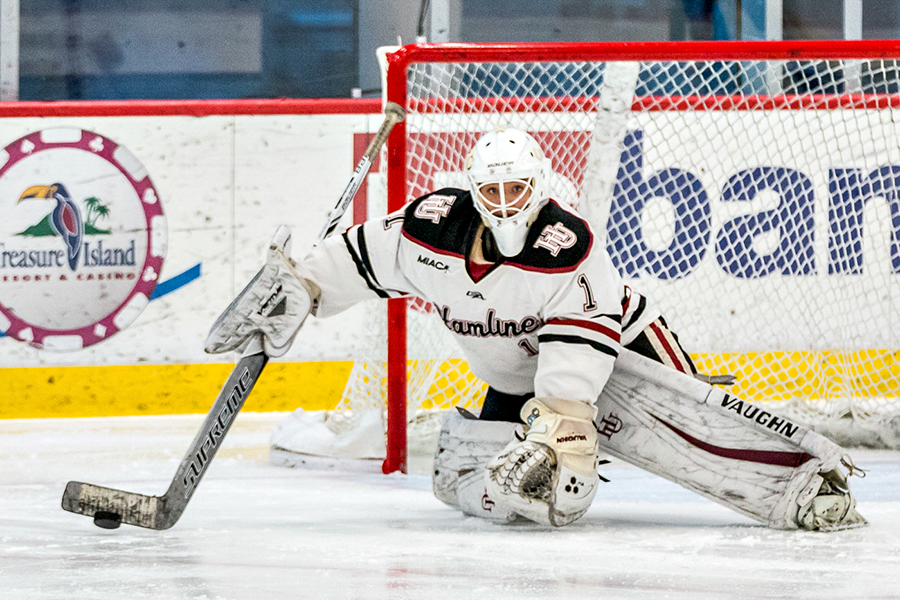The Unstoppable McKenna Hulslander
The one-time goaltending phenom is not going to reach the near-impossible sporting heights once predicted for her. Instead, she’s found peace and perspective as her hockey life nears its end.
By Andy Viano
McKenna Hulslander, all other things being equal, would rather be fishing.
The Kalispell native is not unlike her Montana peers in that regard, and when she and her older brother, Taylor, are back here together they can most likely be found casting in the Flathead Valley’s plentiful waters. There was a time when Taylor was the better angler but, like has happened before in their lives, McKenna caught up to him, then surpassed him, and shows no signs of slowing down.
McKenna Hulslander has almost never slowed down. She has been irrepressible from an early age, blessed with what her brother calls the “it factor.” She dominates any room she enters with an endless reservoir of wisecracking energy, and she has worn an unbreakable smile through a grueling hockey education.
And there was a day not all that long ago when Hulslander was going to be the next big thing on skates, despite growing up in one of the least hockey-centric states in the country. Montana has never produced an NHL player, and while opportunities for boys to play here are scant, the opportunities for girls are nonexistent.
Hulslander’s introduction to hockey came through her brother, a multi-sport athlete who played high-level hockey through his teenage years and went on to star as a quarterback at Glacier High School and set a program record in the javelin at the Air Force Academy. Taylor, who is four years McKenna’s senior, said an errant slap shot from the garage once caught his then 6-year-old sister in the side of the head, a precursor to her many years of fending off pucks with her body as a goaltender. McKenna played almost exclusively on boys teams growing up and, from an early age, would spend hours at the Stumptown Ice Den in Whitefish.
“After school my dad would run me up there and we’d go to practice,” Hulslander said. “In the morning, my mom would get me up … and I would be at the rink at 5:30 in the morning and then I’d come home and I’d shower and I’d go to first and second grade.”
When her skill level outgrew the Flathead Valley, she joined the Kootenay Selects based out of Fernie, British Columbia when she was either 11 or 12 years old, again playing on a team with all boys. The team’s location meant that twice a week, on Tuesday and Thursday, her parents would drive her across the border and back, and they would travel around Canada for games on the weekends.
By the time she arrived at Glacier High School, Hulslander was not just consumed with hockey. She was playing golf in the fall, basketball (along with hockey) in the winter, and throwing the javelin in the spring. She was fully obsessed with sports and sacrificed other parts of her childhood to further her athletic ambitions.
“At that age, I was like, ‘This is the coolest thing ever,’” she said. “I just couldn’t get enough of it. In the summers, my friends were going to the lake and I was going to camps. I was choosing 30-degree hockey weather, freezing, and putting gear on, over the lake and friends and birthday parties.”
Hulslander said her parents, Matt Benedict and Susan Hulslander, never pushed her to achieve in sports and instead hoped to engrain in their children the life lessons that sports can teach. Benedict told his children that sports “are things that you do but not who you are.”
For a while, though, that lesson seemed to be lost on his youngest.
In 2016, When she was 18 and regularly flying to Missouri during the school year to compete for the St. Louis 19U Lady Blues, Hulslander seemed like a surefire NCAA Division I athlete. She was invited to the exclusive USA Hockey National Camp three times when she was in high school, an opportunity reserved for just 10 goalies in the entire country, and at that time no hockey future seemed out of reach.
“In seventh grade I sat on the couch (at) the University of North Dakota, which is a top-five women’s hockey program, and they were like, ‘We want you go come to UND,’” Hulslander said. “And it was Syracuse and top 10 schools that I was like, ‘OK, I’m going to pick from here.’ And then things got jumbled up.”

Recruiting for college sports is a cold, complicated and cutthroat endeavor. It is particularly true in women’s hockey, where there are only 36 Division I programs. That makes for a narrow bottom of a funnel filled with an international pool of aspiring goalies, and as Hulslander learned, it does not take much to convince a coach to look in a different direction.
The first two strikes against Hulslander, at least as she tells it, were things completely out of her control. For one, she is 5-foot-6, which she points out is above the average height of an American female but below average for an elite goaltender. And she’s also a product of Montana, meaning that outside of her time with her out-of-area teams, recruiters had trouble verifying the independent work she was doing. If Hulslander spent two hours at the gym or three hours working on her own at the rink, the recruiters only had her word to go on. In short, Hulslander became a risk, and with little incentive to choose a risky option from an oversaturated pool, the interest from top-tier colleges started to dry up.
“It killed me,” Hulslander said. “I would just be sitting there like, ‘Take a chance on me, take a chance; risk it’ … and no one would risk it.”
So here it was that Hulslander, once with the hockey world in front of her, and after a childhood spent scrambling to make up schoolwork, adding up airline miles and choosing the ice rink over normal high school activities, was not going to get the ending she wanted.
“I was very frustrated,” she said. “In high school it was a very hard journey, it was very tough, because I was going above and beyond what I felt was the requirement to get to that top level of hockey.”
When the dust settled, Hulslander met with Natalie Darwitz, a former U.S. Olympian and head coach at Division III Hamline University in St. Paul, Minnesota. Hulslander said the pair clicked right away, and she is in the midst of her third season as a goaltender for the Pipers. Hamline has gone to back-to-back Division III Frozen Fours, finishing third in 2018 and second in 2019, and Hulslander set a school record with 14 wins as a freshman. She’s shared time in net the last two years, but the Montanan is far more focused on her off-ice progress than the steps she’s taken on it.
“Perspective is actually my word,” she said. “Not only did it change my perspective of hockey isn’t my life; it changed my perspective that I don’t need their approval or confirmation to tell me I’m successful … I’m proud of myself in those moments. I’m proud of who I am.”
Despite the outcome, Hulslander said she would not change a thing about the journey she took to get here. She has no plans to play hockey competitively beyond college but said she’s a “better person” today and that she’s learned the lessons her dad first hoped for her in sports: to work hard, meet challenges head on and grow even when you don’t get the reward you think you deserve.
And, of course, Hulslander would like to do more fishing, at least when she’s not at the rink with her teammates or working on her degree. She is studying pre-law, and when her father suggested she consider becoming an athletic director, she was tickled by the prospect of a job that would allow her to share some of what she learned with the next generation of anointed future greats. She wants not to dissuade them from taking the journey, but to prepare them for the day, no matter when it comes, that the next phase of life begins.
“You have struggles and you have challenges, but who you are will always come back before what you do,” she said. “I think as I progress and I grow older, that’s going to be more and more relevant. What I want to do in life is I really want to help those kids that don’t have that mindset, that don’t see that, and how that’s going to affect the rest of their life.”